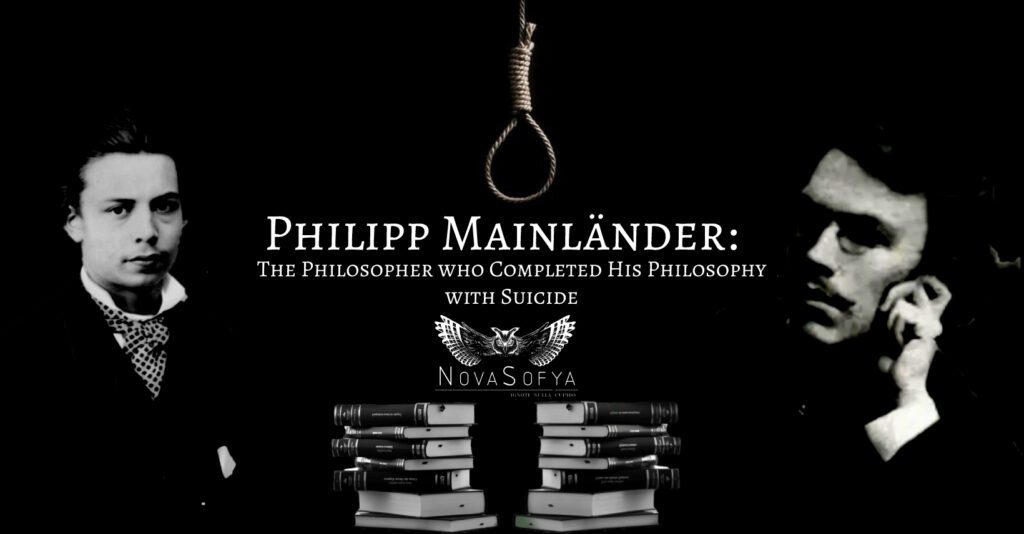Philipp Mainländer: The Philosopher who Completed His Philosophy With Suicide

The date was April 1, 1876. A man who thought he was “created to achieve ‘nothing,’ that is, death,” took the first published editions of his book, which he had been working on for years, and went home. Perhaps his soul was dominated by the peace of the feeling of accomplishment. As a matter of fact, his efforts have achieved their goal; the first edition of his book had been published the day before. But that was only half of his goal. There was one more job to be done, and he had to complete his unfinished purpose. In the middle of the night, he stacked several volumes of his newly published books. he climbed on his books, put a noose around his neck, and immersed himself in the void of “nothingness.”
Some thought Batz, nicknamed Mainlander, was crazy, others said he was depressed. But his long-planned suicide was also an act of conviction for nothingness; Attainment of nothingness was indeed the ultimate will and testament of his philosophy. In a pessimistic age, Batz was the most radical of the pessimists. Like all pessimists, he taught that life is not worth suffering and living. Unlike the pessimistic philosophers of others, Batz not only taught his philosophy, but lived and virtually breathed it.
The book that set the stage for Batz’s suicide on that sad night was Die Philosophie der Erlösung, the work of his life, the first volume of which appeared in 1876, a few days before his death. In the months preceding his suicide, Batz had written a second supplementary volume, which would be published only in 1886.

Die Philosophie der Erlösung was a masterpiece of its own. It was the expression of a complete worldview that included an epistemology, metaphysics, aesthetics, physics, ethics, and politics. All these elements of the book supported its underlying message. This message was that salvation from the misery of life lay in death alone, and death meant nothingness.
The main purpose of Batz’s work was to explain Christianity on a basic secular or rational basis. According to him, the esoteric meaning of all the fundamental truths of Christianity was; We can be freed from the suffering in life only through death, that is, through the attainment of the peace of absolute nothingness. That is what Christ wants to say.
According to Mainlander, “God is dead.” The first person to use the theme of God’s death was Philipp Batz, aka Mainlander. Nietzsche only popularized this concept.

Besides the death of God, Batz’s philosophy involves a stronger and more surprising thought. It’s about his desire to die. According to him, the ultimate goal of the inner effort of all beings, of all the activities of being, is death. Batz tells us that at the core of everyone lies their deep longing for absolute nothingness. He recognizes that there is an instinct for self-preservation within all of us, but when he thinks deeply, he insists that the desire for life is really only a means to death. According to him, we live only for the sake of death.
Philipp Mainlander was a social democrat or communist who preached the value of love and the equal distribution of wealth. Despite the suffering of the common man, he had deep sympathy and was preoccupied with social questions concerning the poverty of the people and the working masses, much of his thought. In this context, Philipp Mainlander had a similar sensitivity to the Russian thinker Radishchev, who committed suicide before he wrote in his last note before he died, “When I look back, I see that my soul was shattered by the suffering of humanity.”
One of the main aims of his Philosophie der Erlösung was to convey a message of salvation for ordinary people. While Schopenhauer emancipation appealed to an elite minority, Mainländer directed it at all of humanity. Again, he had similar and different points with Schopenhauer. First, Mainlander placed emphasis on the concept of will and saw it as an ontological archa. But where he differs from Schopenhauer is in the scope of this question of will. In Schopenhauer, the will is singular and timeless. Mainlander, however, has focused on the concept of will with a more pluralistic approach. Again, in Schopenhauer, while the silencing and destruction of the will is almost impossible, according to Mainlander, almost all of humanity is gradually moving towards the silencing of the will, the desire to live, in his own words, to salvation.



